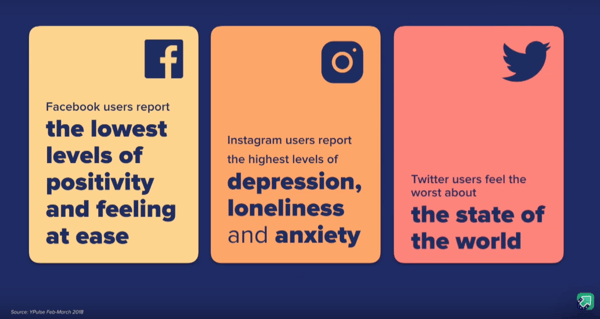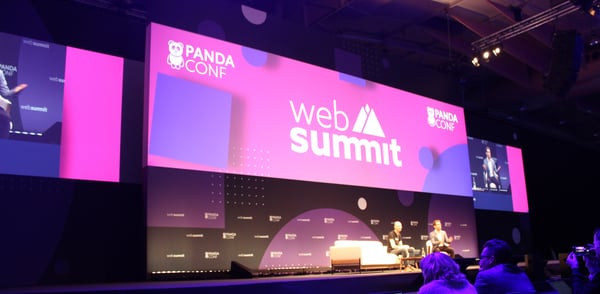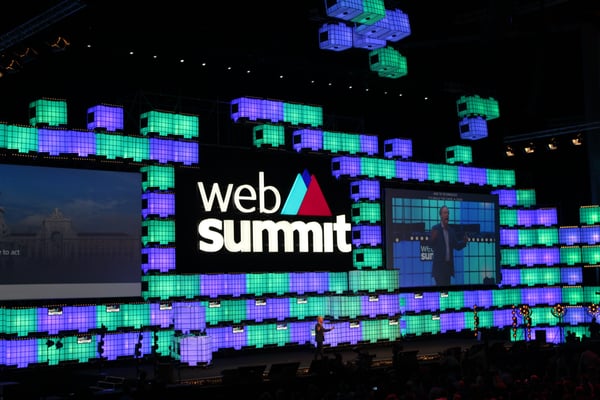
Web Summit 2018 Lisbon: Days 3 and 4 Highlights
After a very exciting first two days at Web Summit Lisbon 2018, which gathered over 70,000 people in the capital of Portugal, including 31,000 Women in Tech, #BrandBastioneer Carina Miranda continues this series of blog posts with her highlights and key takeaways from Days 3 and 4! (Read Part 1 with highlights from Days 1 and 2)
Day 3
“Influencing the influencers” by Eyal Baumel (Yoola), Reza Izad (Studio 71), Alice-Azania Jarvis (Elle UK)
My key takeaways from this talk were that:
- The number of companies who are relying on influencers as a core part of their marketing strategy is growing.
- With demand comes supply, and new influencers are popping up everywhere.
- This makes it even more important to carefully screen and select the right influencers, as many influencers are low quality ones, with fake followers, low engagement, or stolen content that isn't original.
- Selecting the wrong influencers can result in a PR backlash and end up doing more harm than good.
“The internet happiness revolution” by Alan Schaaf (Imgur), Joe Lazauskas (Contently)
This talk was something on my “must-catch” list as the topic is something that is always at the forefront of our minds at BrandBastion. Our mission is to “make the world a more action-driven place” as “action is always better than apathy”. We believe that when brands take action to reply actively to customers, it will prompt customers to also take action and seek for help in a more constructive way, instead of the frustrated venting you often see occurring on brand’s social media pages when there is no response from the brand after days.
I was curious to see what Imgur, one of the most-visited websites in the United States, would have to say about what people can do on the Internet to make it a more pleasant, happy place.
“Social media is hacking us as individuals in a lot of profound ways.”
Key takeaways:
- In the last 5 years, social media has changed in a quite negative way. Today, social media platforms tend to make people feel worse, rather than better, after using it. It is a place of distorted reality, where most user look at other people’s photos and often don’t realize it is just an illusion, far from reality itself. A false happiness.
- What most don’t realize is that what most celebrities and influencers show on social media is a “highly curated personal brand”.

- According to data collected by Imgur, people are getting tired of the endless stream of perfect photos on social media, and are turning to platforms like Imgur to break away from Photoshopped perfection.
- Schaaf said that while most social media platforms have a purpose (for example, Facebook’s is ‘bringing the world closer together’), they lack values and are in a great need of them to generate more valuable content. They also lack clear rules and terms of service. Their business model is one of addiction - to make more money, they need to keep users scrolling, regardless of what the content is they’re looking at.
- Imgur, on the other hand, states upfront at registration that moderation exists on the platform and have clear community rules for all “Imgurians”. These are rules that every user needs to be aware of and respect before they start using Imgur.
Why does Imgur take such strict measures, when many other platforms are choosing to keep things open and leave the responsibility for content posted with the users of the platform?
“Before, the internet was a positive place to be. Today it makes people feel worse. Imgur’s goal is to bring back the good old days where internet was all about positivity.”

“More than gaming” by Kristen Garcia Dumont (MZ), Emmett Shear (Twitch), Josh Constine (TechCrunch)
The next talk I attended, which focused on the world of gaming, continued the theme of online platforms' responsibilities in keeping speech and behavior decent. Key takeaways:
- For Shear, when it comes to tolerating hate speech on Twitch, it’s pretty simple - Twitch doesn’t provide a free speech platform. It has a set of principles and values that must be respected by all users as otherwise, they get excluded from it.
- Dumont from MZ shared similar sentiments. Once users disrespect the terms of their platform, they get banned from it.
- While the principle is in place, the enforcement is more tricky - catching trolls isn’t that easy. Right now, when someone is behaving badly in a game, the platform can only identify the device the user is on, not who exactly the user is. Efforts are still in place to improve their way of moderating and banning infringing users from the platforms.
“Digital peace in the age of cyber threats” by Brad Smith (Microsoft Corporation)
Smith believes we are facing a new digital era where new threats are constantly emerging, and that more than ever, we need to start acting immediately to stop it from scaling further.
"The tools that we have created had been turned by others as weapons.”

Key takeaways:
- "We had already faced several cyber-attacks in previous years, but it was only last year, after Ukraine's massive NotPetya attack, that [the world's eyes] started to open to the issue. 2017 was a wake up call”.
- Cyber attacks are more serious and dangerous then only online threats. Before they used to be underestimated by leaders, as the issue happened within machines and therefore no humans would get harmed. Nowadays, this perception has changed and its clear now that cyber warfare can cause more harm then just online.
- Just last year, 1 billion cyber attacks occurred.
“In a world where everything is connected, anything can be disrupted."
“Technology evolved but humanity failed to keep up.”
“If we want this century to be better, we need to do better.”
Smiths calls for more principles, regulations and laws that will help on regulating the internet. This can and should be achieved mainly by governments, but business companies also play a big role on this matter. The technological sector has a special responsibility, as they are the ones in the front line of this war.
“We are the first responders. We need to stand up for clear principles”
There are a few projects that were already launched by Microsoft to fight this issue, the Defending Democracy Program and the Free election defense tool. Microsoft has also started the Digital Peace Now petition, following with the #StopCyberWarefare, and is inviting everyone to sign this document with the goal of achieving Digital Peace.
Day 4
Some interesting talks and highlights from the final day of Web Summit included:
“Modernising traditional brands” with Daniel Grieder (Tommy Hilfiger Global and PVH Europe), Nadja Swarovski (Swarovski), Jim Lanzone (CBS Corporation), Karen Tso (CNBC): A common trend for both Tommy Hilfiger and Swarovski is making shopping as simple and quick as possible. Tommy Hilfiger has been investing into a “see now, buy now” strategy that has been in place for several fashion shows, where consumers can order the looks right after seeing them on the catwalks. For Swarovski, Instagram shopping has been an incredibly useful tool for them as well.
“Why is the scooter market suddenly worth billions?” by Caen Contee (Lime), Markus Villig (Taxify), Nate Lanxon (Bloomberg News): Players like Lime and Taxify believe there is a lot of potential in this market as more and more people are looking for convenient transportation alternatives.
“Movement is freedom.” - Lime
At the same time, the industry continues to face two major challenges: regulations and safety. Companies have the responsibility to ensure rider safety in order to maintain customers' trust. Along with that, differences in regulation across cities is a major hurdle for all these transportation / ride-sharing companies seeking international growth.
“Can we save the media industry from itself?” by Evan Williams (Former Co-founder of Twitter and founder of Medium), Laurie Segall (CNN): Williams during this talk looked back at what he would have done differently, knowing what he knows now, in co-creating Twitter.
“We created a world where attention is rewarded.”
He still maintains that social media is important to allow the spread of information on many levels and allows people to stay connected through many different method. However, if he were to create Twitter all over again, he would have taken down the number of followers displayed on each user's profile. He believes that is one of those details that can cause a lot of pressure on users to "keep up".
And that wraps up a very fulfilling few days at Web Summit! We hope you found these nuggets and takeaways as insightful as we did, to inform your marketing strategy in the year ahead and beyond.